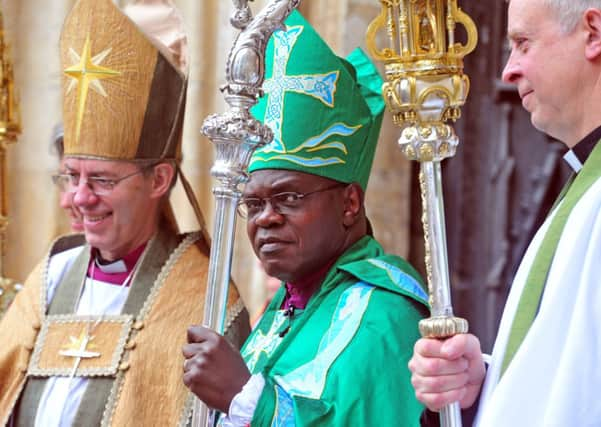Church divided on right to die debate


The renowned religious leader said he reveres “the sanctity of life – but not at any cost”.
His comments come after an extraordinary U-turn by the former Archbishop of Canterbury Lord Carey, who said he had changed his mind on assisted dying after considering cases like that of locked-in syndrome sufferer Tony Nicklinson and “the reality of needless suffering”.
Advertisement
Hide AdAdvertisement
Hide AdOn Friday former Labour Lord Chancellor Lord Falconer’s Bill on assisted dying, which proposes allowing doctors to prescribe a lethal dose to terminally-ill patients judged to have less than six months to live, will come before the House of Lords for a second reading.
In The Observer, former Archbishop Tutu said: “I think when you need machines to help you breathe, then you have to ask questions about the quality of life being experienced and about the way money is being spent.”
Strongly condemning the treatment of Nelson Mandela in his later years, he said it was “an affront to Madiba’s dignity” to force him to be part of a television appearance with other political leaders as he neared the end of his life.
He notes that the Lords Bill will be debated on the first anniversary of Mr Mandela’s death.
Advertisement
Hide AdAdvertisement
Hide AdArchbishop of Canterbury Justin Welby said the Bill was “mistaken and dangerous” and would mean elderly and disabled people coming under pressure to end their lives.
He asked: “What sort of society would we be creating if we were to allow this sword of Damocles to hang over the head of every vulnerable, terminally-ill person in the country?”
The Church of England has consistently argued for no change in the law on assisted suicide and has called for a new inquiry into assisted dying.
Bishop of Carlisle James Newcome said: “The present law as it stands has just about the right balance between, on the one hand, real compassion for those who are suffering, and on the other hand, care for those who are elderly, disabled, and others who might find themselves in some considerable danger if the law was changed.”
Advertisement
Hide AdAdvertisement
Hide AdHe added: “It has been the view of the Church of England that assisted suicide or euthanasia of any kind is not consistent with our beliefs, and I think that will continue to be the line that certainly those of us who are in the House of Lords and the bishops will be taking next Friday when this is debated.”
He said Lord Falconer should withdraw his Bill in favour of a Royal Commission into the subject.
Letters: Page 10.